Milly Johnson's Blog, page 2
June 12, 2022
HRT or Not HRT - That is the Question
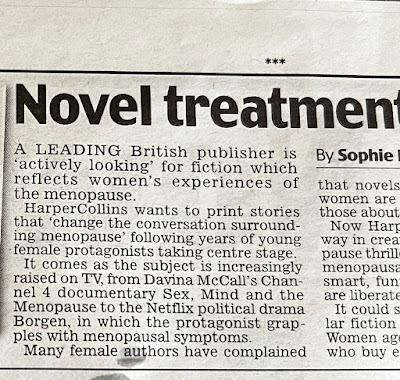

So yesterday this appeared in the Daily Mail and eyes rolled everywhere in our writing community. There are two issues of course. The first is that there is a misconception that there are no books out there for women of a certain age, featuring women of a certain age. The dawn of a 'new genre' - sorry, loves, that sun isn't just peeping over the horizon, it's been shining brightly for years.
When I started, though I enjoyed reading books about twentysomethings... they were no longer relevant to me and I wanted to write books for women like me who I could identify with: sparky women of forty, fifty, six, even seventy. Strong women, not 'nana's who crocheted incessantly while chomping on Wethers Originals, but who had sex and fun and were chiselled from wisdom and experience. There are LOADS of great books out there written by my big name contemporaries that champion older women and for this article to say 'new genre' sticks in my craw because it's as they aren't even on the radar!
The second issue is 'the menopause'. Yes we know middle-aged women go through it. It's like Covid though - you can skirt over the issue or acknowledge it. In one of my books, I did feature it. A group of 'Old Spice Girls' in my Sunshine Over Wildflower Cottage. I wanted to talk about it because I sensed a tide turning. That said, it was never more about their hot sweats than the women themselves. THEY took centre stage, not their symptoms (though some made for good comic effects).
The book featured in the article 'The Change' is excellent. I was sent an advance copy and I enjoyed it. It's got a lot more to it than just women going through a natural stage in their life, there's magic in the pages - literally - and I hope it does brilliantly, I'm sure it will. BUT Clare Hey, who is my editor and mentioned in the article is absolutely right that S & S are proud to publish older female authors writing for and about women our own age because I've been with them from the beginning and I know this for a fact.
Women in our books walk tall and are comfortable in their own skin anyway without needing the menopause to empower them. I suppose there will be people reading the article and already penning their menopause thrillers and maybe that's what the market wants. But is this just the flip side of the 'chick lit' tag? Will it spawn a whole library of books focusing on memory loss, bloating and er... memory loss rather than strong characterisation and plot because if you chuck some Tenaladys in, no one will notice the lack of them? Do you have to throw in a daily dose of HRT to make your women strong? Are they competent because of the menopause or in spite of it.
I think Ronnie Henry had the perfect comment on this whole thing. She said that she 'likes her women to be defined by a bit more than their hormones, though obviously that can be part of their make-up. But they are more than hot flushes and mood swings.'
There you have it. If the menopause has to feature, let it not absorb all the interest or we are heading for 'chick-lit II' and - dear god - we really don't want that. We've enough battles on our hands to be taken seriously! I'm waiting for the male writers to catch on and write the equivalent. 'Dan is on the trail of a serial killer. He was a second rate cop but since his prostate started to swell, he finds his detective skills have sharpened...' I somehow don't think that's going to happen.
And should you want some books that feature older women who aren't dotty drips groping for their calcium supplements...
Christmas at the Beach Hunt - Veronica Henry - a plot driven by menopausal women running away from Christmas
The Singles Series - Elaine Spires - the series follows a peri menopausal woman Eve who takes groups of tourists all over the world while living her best life.
A Scandinavian Summer - Helga Jensen-Forde - whose books always feature over 45s
The Library, The Girls - Bella Osborne - both books have fabulous older women as lead characters
Sunshine and Second Chances - Kim Nash - is about 4 x 50 year olds going away to celebrate their joint birthdays
Her Last Holiday - CL Taylor - a thriller with a 52 year old main character
Elaine Everest books - who writes about older women in her sagas as they are so colourful and worldly wise
Cathy Bramley, Jill Mansell, Jo Thomas, Catherine Jones, Katie Fforde, Judy Astley - all write fabulous mature women
The Old Girls' Network - Judy Lee
The Spa Break - Caroline James - '70 is the new 40'
Five French Hens - Judy Leigh - 5 women in their 70s on a hen do in Paris.
Karin Trunk Holmqvist - a Swedish author who writes about older people, books which are funny as well as wise.
The Winter of Second Chances - Jenny Bayliss - a fab book about a menopausal woman starting over.
Alex Brown - whose last TEN books all have older heroines
Woman of a Certain Rage - by Georgie Hall
Mental Pause - Anne Louise O'Connell - a thriller about a woman going through the menopause who is accused of murder
So... not really a 'new genre' then eh?
February 13, 2022
New Paperback Out
Oh and I've also joined TikTok. It's just a bit of fun (but seemingly an essential these days) so some of my vids might be a bit 'off the wall' https://www.tiktok.com/@themillyjohns... Do pop along and give me a like (seeing as there isn't a button for a groan).
Be lovely to see you at an event. New ones keep getting added so do keep checking in.
Lots of love
Milly x
November 29, 2021
Nothing to See Here Folks, Just Women Writing Fiction. Do Move Along...
The world of publishing is terrified of coming across as discriminatory in this age of equality for all. It is rightly important that everyone is represented. Unless you happen to be a woman writing ‘popular’ fiction, genre fiction, if you like, contemporary stories, romance, historical, sagas. Then you might as well grab yourself a sackcloth and a bell and roam the streets calling ‘Unclean, unclean’ ahead of you. Misogyny is alive and kicking in our world, though it pretends it isn't.
Only recently Phillipa Ashley and I were having a convo. 'Why don't the telly have a popular fiction series with the big selling books people really buy and interviews with authors in their homes/hometowns and some sneaky looks at the world of publishing and bookselling and supermarket books? They could visit creative writing classes for real people, or go to a book festival, like in Cannock?' she said (she set up the Cannock Chase book festival and it was fabulous!). 'No posh elitist stuff'. She put a worm in my brain that great to the size of a giant anaconda. The pair of us have been batting back and forwards ideas, as well as frustrations.
Take this week. Someone came out on Twitter to say that she watched the Sara Cox book show because she likes her personally, but...
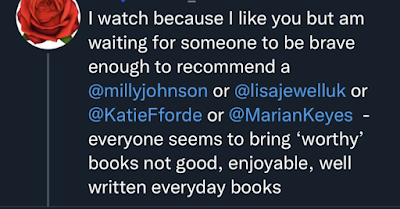
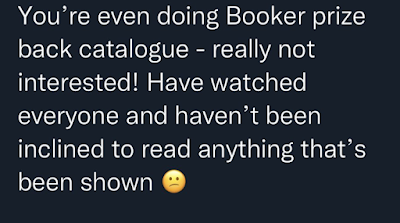
That kicked a nest full of hornets. Why indeed? What is it about our books that terrifies presenters from featuring them? Do they think that they’ll be laughed at by the cool kids for daring to advertise a book full of wisdom and wit that features that stuff of life we all crave – romance (and though it’s classified as romance, sometimes the big love story is about a community coming together or friendship). Will these presenters or journos reveal themselves as inferior beings for choosing a book for their show/publication that doesn’t have a serial killer in it? It is a question not even Stephen Hawking could have answered with all the might of his knowledge: why are our crafted books seen as ‘lesser’?
We have a lot of support from some fabulous journos, it has to be said. Some of the magazines out there are shining stars of generosity, thank goodness. They aren’t afraid to feature crime books too, but then no one is. And yet, for many, there is a reticence, a terror about applauding one of our books publicly especially if they feature women on the cover. Guess what – we have male readers as well, folks. And they say we write ‘men’ every bit as good as men do. Go us!
A couple of years ago I was invited onto a radio programme with Eamonn Holmes to talk about prizes and book shows that totally ignore us. It was, what Mother Teresa might have called ‘a shit show’. I was led to believe I was being guided onto a sympathetic platform to make a case: ‘Why can't we have a show for genre fiction? Why does every book show have to be so blimming highbrow when we know our readers want to hear about US?' I'm doing all right, I'm in supermarkets and bookshops and I get my fair share of PR, but plenty of good authors aren't and they're caught up in a vicious circle of needing to get into bookshops/supermarkets to get exposure, but need the exposure to get into the shops. So chagrin was in plentiful supply as I was told with a snigger that I ‘probably write the sorts of books that are made into films that come out just before Christmas and always feature a lumberjack’. Totally dissed the whole genre, while worshipping at the shrine of his other guest Marian Keyes WHO WRITES THE SAME BOOKS WE DO. When Marian said she knew my books, EH was HORRIFIED that she could mix with the likes of such a lower caste. The irony was that he galvanised every prejudice I had gone onto the programme to prove existed and wanted to break down. Disappointing wasn’t the word, he could have done a lot of good there. An opportunity totally wasted. Just an excuse to use up some excess tomatoes that needed throwing at an upstart author, albeit one who's shifted millions of books, who the researcher hadn't even bothered to look up.
The sniffy people see our books as fluff, insubstantial, 'chick-lit' (oh please - think of something more original!) but maybe they should see them as the big business they are, as oil in the wheels of the industry machine, that keep it going so it can give out fat advances to authors of literary fiction who won’t earn it out. We make profit. No one gives us publishing deals because they feel obliged to. During the pandemic our figures soared as people wanted the dear familiarity of human contact and company and simple pleasures such as going out for some cake and they couldn’t do it in reality, so plumped for it virtually. They wrote more letters to us than usual – and that’s quite a quantity. Thank you for keeping me sane. Thank you for giving me my reading mojo back. Thank you for the escapism, for helping my destroyed mental health, for keeping me company during a long night shift on the ward. The letters make me cry a lot. They can be heartbreaking. We don’t write books to change people’s lives but sometimes that happens as a surprising byproduct. We write templates of happy lives for people who sometimes follow in the footsteps of our fictional characters and realise that with a few small, but essential changes, they can alter a lot they are unhappy with and make it so much better.
We aren't sniffy about other genres, 'My goodness, a story featuring a talking cat, how ridiculous!' (The Last House on Needless Street, incidentally. Read it, it's amazing!) Reading is subjective, there are books for all tastes and exposure should reflect that. It's not for programme makers to censure what people enjoy and want. Give them a wide selection. Give them literary and crime and humour and romance. Chuck in a saga or a good wartime novel.
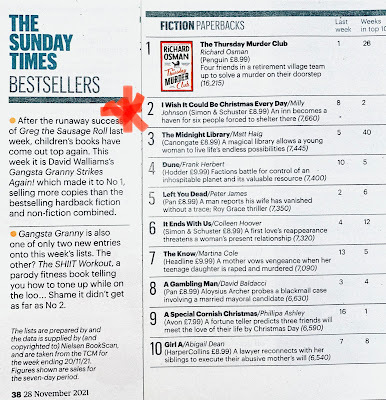
Last week I sold 7660 paperbacks, only Richard Osman sold more in fiction paperbacks. No mention though of the northern oik impudent female who reached her highest chart position on the Sunday Times bestseller list, especially at this time of year where a sea of big names and celebrities have their books out jostling for space on the shelves. At number nine on the list Phillipa Ashley with her ‘A Special Cornish Christmas’, over six and a half thousand sold. Cathy Bramley and her ‘A Merry Christmas Project’ top of the Amazon charts… Jenny Colgan on the New York Times Best seller list, Trisha Ashley storming it with a hardback, Nicola May who made the publishing trade mag acknowledge her astronomical self-published sales figures and those who came after her … and more names. Every one of these a businesswoman a driven, powerhouse of grit and determination and luckily a backbone of iron.
Oh and if you're thinking 'She's just pissed off that she didn't get a mention.' Too right I am. Because I would have if I hadn't written in my genre and that is my whole point. '...And snapping at the heels of Richard Osman is literary writer MJ with a startling X sales this week with her book about being snowed in.' And much as I do love RO, he's been plugging up the top spot so much, I really don't need to read every week that he's clinging onto the gold. I want to hear about X who has written a book about a Christmas market and has thudded into the number seven spot. Where has she come from? What's her back story? Why have I been reading The Bookseller for X years and can't remember the last time a romance writer had a profile piece done about her, apart from Jojo Moyes who has become so massive she is impossible to bypass.
And don't get me started on libraries - you know the places that some would have you believe aren't used any more. Well in the past year my books have been borrowed almost 220,000 times. That's just one romance author... And there are many more popular than me. Why is it so wrong to want to be entertained? No one looks down on Netflix (quite the opposite) - the sole purpose of which is to... entertain!
Guess what, world, there is a massive appetite for our books! Especially Christmas books written to lift and entertain. And yet the newspapers filled their pages this week with the ‘best books to buy for presents’ and not a mention of any of ours. Do we not fit in Christmas stockings? Are our corners too spiky? Because, as a reader as well as a writer, I’d like to find a book written by one of my peers in my Christmas pile please, Santa. I want to hole up for a few days and immerse myself in a lovely feelgood well-written story that whisks me away while I’m drinking my Baileys. And judging by how fast our books are flying off the physical and virtual shelves at the moment, so do readers. Which leads me ask, who are those ‘lists of must-read books’ written for? Do people who read the ‘posh papers’ not also read popular fiction? Shouldn’t the press serve the readers who want to know about the books of our genre which are available to buy? Are they actually in touch with the people who read their pages? Are the authors of these books of less interest than those who write literary fiction?
Diss the novels and you diss the readers who buy these books. Who are they to decide what their readers might like, after all reading is so subjective. One of the Hairy Bikers reads everything I put out there; I'm his 'guilty pleasure' he tells me. Plus what message are we giving out to future writers? That if they choose to write books that people in their millions love that they’re not actually aiming very high? That’s one hell of a mixed message.

This industry can be ridiculously middle-class and prejudicial ... and cruel and short-sighted. Women writing Christmas fiction in the Sunday Times best seller list? Move along please, nothing to see here, folks. What sums it up is an observation of Phillipa’s, given that the Sunday Times narrative at the side of its lists this week prefers to celebrate ‘Greg the Sausage Roll’ and ‘The Shiit Workout – a parody fitness book telling you to tone up while on the loo’. Phillipa said, ‘Who knows, we might even be considered literary next to books about shit and a sausage roll’. Sadly no; that’s too much of a stretch, Pip… even in the world of fiction!
************
And just in case you were interested... here are just some of the season's pick of books that you SHOULD be seeing featured more! Written by women at the top of their game, Sunday Times bestsellers, multi-million sales, intelligent, brilliant and thoroughly wonderful novelists at with hearts as big as their talent. Click on the title to read more about them. Let yourself be seduced by a blurb. You won't fancy them all, but you'll definitely be drawn to some - and others will be drawn to others, because, as I said, we all like different books, but all books are liked by someone. I've found some authors just by chancing my arm, widening my reading comfort zone and you may find your new favourite below. So browse, buy... and treat yourself or a loved one. Maybe both!
(in no particular order at all because they all should be first ..)
by Phillipa Ashley
For Bo Grayson, Christmas has always been the most wonderful time of the year. Well, until she had her heart broken last December…
When Bo Grayson and her friends meet a mysterious fortune teller, she gives each woman the same prediction: You will meet the love of your life by Christmas Day.
But Bo quickly dismisses this as nonsense. And with the festive season in full swing, she has plenty to keep her busy: creating the seasonal menu for her Boatyard Café, getting her rock and roll dance group ready for their Christmas show – and avoiding thinking about last December, when her fortune took a turn for the worse…
Besides, she definitely isn’t ready to open her heart again. But will fate – and perhaps a sprinkle of Christmas magic – change her mind?
Celebrations at the ChateauJo Thomas
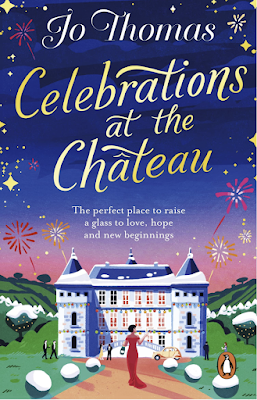
When their grandfather dies, Fliss and her sisters are astonished to inherit a French chateau! Travelling to Normandy to visit the beautiful if faded house, they excitedly make plans over delicious crepes and local cider in the town nearby.
They soon discover the chateau needs major work and a huge tax bill is due . . . Unable to sell but strapped for cash, Fliss determines to spruce up the elegant old rooms and open a B&B.
But Jacques, the handsome town mayor, is opposed to her plan. When it becomes clear that the only way to save the magnificent castle is to work together, Jacques and Fliss discover that they have more in common than they think...
Snowed In With YouPenny Parkes
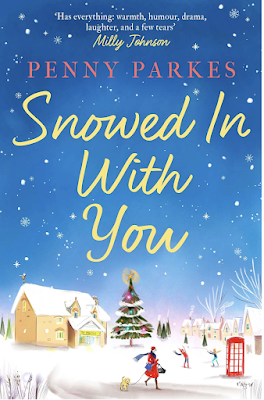
Larkford Surgery is the heart of a tightknit community in the Cotswolds, as well as a hotbed of drama, rivalry, resentment and romance - and that's just the doctors …
Dr Holly Graham has just had twins and is finding life exhausting. Even with husband Dr Taffy Jones and devoted friend Elsie by her side, she is completely outnumbered. Making the transition back to work will be no easy feat but then an unexpected job offer changes everything.
Her maternity cover, Dr Tilly Grainger, has arrived in from South America to cover but it seems that she isn’t finding life in the peaceful Cotswolds valley as rewarding as she’d hoped, and she is causing chaos.
Then widower and former rock star Connor arrives in Larkford, ready for a new start. He’s not sure how he will fit in with his new tightknit community. Has he made a mistake leaving his old life behind, or will he find exactly what he’s looking for in the beauty of the Cotswolds?
Christmas For BeginnersCarole Matthews

Christmas is fast approaching at the new Hope Farm. Owner Molly Baker has been convinced to organise an open day to raise some much-needed funds ahead of the New Year, but the nativity tableau is proving challenging. With anti-social sheep, awkward alpacas and a seriously sequined Santa Claus to assemble, Molly is feeling overwhelmed, and in desperate need of some Christmas spirit . . .
Despite the chaos of the farm getting in the way of her event planning, Molly is looking forward to spending the holidays with boyfriend Shelby and his son, Lucas, hopeful that a happy family Christmas is exactly what they need to draw them all together. But while she is busy making plans on the farm, Shelby, it seems, has ideas of his own.
As the nativity draws near, the team are working hard to pull off a spectacular festive fete - and make sure the animals and humans remain on their best behaviour.
Will this Christmas be merry and bright... or is there more than one surprise in store for Molly and Hope Farm?
The Merry Christmas ProjectCathy Bramley

Christmas has always meant something special to Merry - even without a family of her own. This year, her heart might be broken but her new candle business is booming. The last thing she needs is another project - but when her hometown's annual event needs some fresh festive inspiration, Merry can't resist.
Cole loves a project too - though it's usually of the bricks and mortar variety. As a single dad, his Christmas wish is to see his kids again, so getting the new house finished for when they're all together is the perfect distraction.
But this Christmas, magic is in the air for these two strangers. Will it bring them all the joy they planned for . . . and take their hearts by surprise too?
After all, anything can happen at Christmas. . .
One More Christmas at the CastleTrisha Ashley
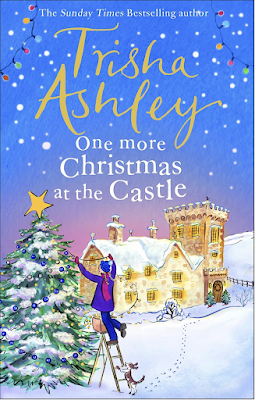
Elderly widow Sabine knows this will be her last Christmas in her beloved home, Mitras Castle. Determined to make it just like the ones she remembers from her childhood, she employs Dido Jones of Heavenly Houseparties to help with the big day.
Dido is enchanted by the castle as soon as she steps through the imposing front door. And as Christmas day approaches, her feeling of connection to the old house runs deeper than she first thought.
But when the snow begins to fall and Sabine's family arrive at the house - including Dido's teenage crush Xan - tensions rise around the castle's future and long-buried mysteries begin to unravel...
As past secrets come to light, can this still be a magical Christmas to remember?
A Cosy Christmas at Bridget's Bicycle BakeryAlex Brown
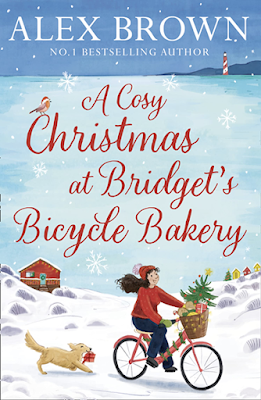
Bridget smiled to herself, certain she could see one of the stars twinkling extra brightly in that moment as if to acknowledge her wish and convince her that, yes, Mulberry-On-Sea was just the place they all needed to be. Surrounded by those happy memories of holidays and special times where nothing bad ever happened…
Finding yourself without a home in the weeks before Christmas would break most people, but for Bridget Carrington it’s a chance to start again. Mulberry-On-Sea has always been her happy place and she’s hoping it can work its magic this festive season and heal her family after a difficult year.
Now, as the community wraps Bridget and her children in its warm embrace, she starts to feel like herself again. With a new business, kids who are starting to smile, and the promise of a second chance at love, Bridget’s holiday season might just be a happy ever after…
Underneath the Christmas Tree By Heidi Swain
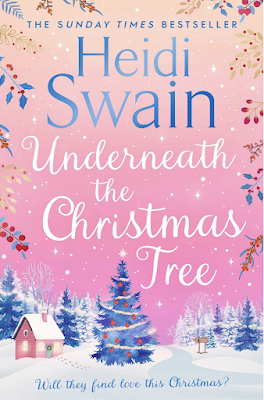
Wynter’s Trees is the home of Christmas. For the people of Wynmouth it’s where they get their family Christmas tree, and where Christmas truly comes to life.
But for Liza Wynter, it’s a millstone around her neck. It was her father’s pride and joy but now he’s gone, she can’t have anything to do with it. Until her father’s business partner decides to retire and she must go back to handle the transition to his son Ned.
When Liza arrives, she discovers a much-loved business that’s flourishing under Ned’s stewardship. And she’s happy to stay and help for the Christmas season, but then she has other plans. But will the place where she grew up make her change her mind? And can it weave its Christmas cheer around her heart…?
The Christmas BookshopJenny Colgan
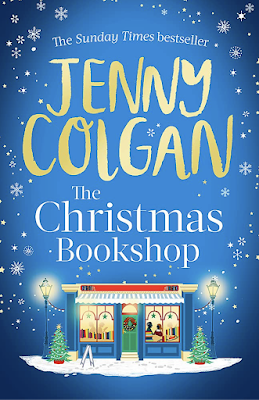
Carmen has always worked in her local department store. So, when the gorgeous old building closes its doors for good, she is more than a little lost.
When her sister, Sofia, mentions an opportunity in Edinburgh - a cute little bookshop, the spare room in her house - Carmen is reluctant, she was never very good at accepting help. But, short on options, she soon finds herself pulling into the snowy city just a month before Christmas.
What Sofia didn't say is that the shop is on its last legs and that if Carmen can't help turn things around before Christmas, the owner will be forced to sell. Privately, Sofia is sure it will take more than a miracle to save the store, but maybe this Christmas, Carmen might surprise them all...
Never Kiss a Man in a Christmas JumperDebbie Johnson(Made in a Hallmark film last year!)
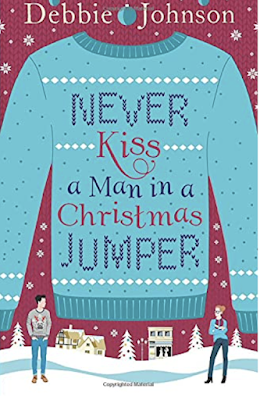
You’ve seen Mark Darcy in his reindeer jumper, now meet Marco Cavelli in this season’s Christmas knit!
For single mum Maggie, Christmas has always been a family occasion – her daughter Ellen filling the house with her bubbly warmth and mistletoe, her dad Paddy having one too many festive tipples, and the traditional family Christmas tree looking like a drunken elf vomited a rainbow all over it.
But this year, with both Ellen and Paddy away for the holidays, Maggie’s facing a truly blue Christmas – alone with nothing but a bottle of Baileys and an M&S turkey dinner.
Until walking the snowy streets of Oxford, Marco Cavelli quite literally crashes into her life – and, complete with broken leg, becomes her unexpected houseguest. All dreamy brown eyes and 6’5” of gorgeousness, the man is hotter and more delicious than a freshly baked mince pie.
Though Maggie always thought it’s a truth universally acknowledged that you never kiss a man in a Christmas jumper?
Starry Skies in Ferry Lane Market
Nicola May
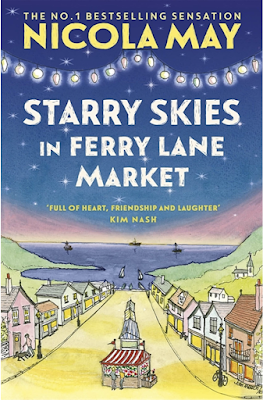
When Star Bligh got pregnant at the age of sixteen, she thought her life was over. Now thirty-three, mother to Skye and owner of the successful jewellery stall in Ferry Lane Market in Hartmouth, Cornwall, she wouldn't change a thing about it.
Well, maybe one. A few months ago she fell hard for American visitor Jack, but then he left without even saying goodbye and ever since she has struggled to get him out of her head. Until the handsome, roguish Conor turns up and sweeps her off her feet. But then one day, Star is shocked to bump into Jack. He's back in Hartmouth to tell her why he left - but is she ready to listen?
As things get more complicated with her love life, another revelation threatens to turn the lovely world she has built for her and Skye upside down. But could this be the one thing that will make it complete?
Mandy Baggot
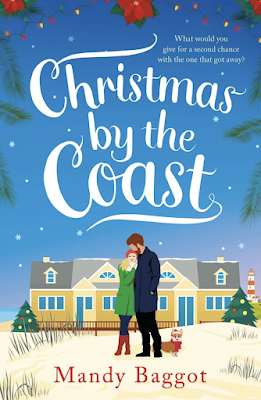
After a terrible heartbreak, Harriet Cookson worked hard to build her life back up. Now she has a dependable boyfriend, a great job and a decent flatshare. But when her beloved grandmother passes away, Harriet drops everything to fly out to the Hamptons to comfort her grieving grandpa.
Christmas is coming and as she arrives on the sandy beaches of her childhood in Montauk, Long Island, Harriet spots someone she never expected to see again - her 'one that got away', ex-soldier Mack Wyatt. Now, Mack is determined to win Harriet back and show her that the life she's been living might be the wrong happily-ever-after.
The Christmas EscapeSarah Morgan
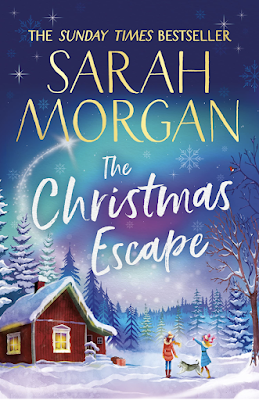
It was supposed to be Christy Sullivan’s perfect Christmas escape – a dream trip to Lapland with her family and best friend, Alix. But facing a make-or-break marriage crisis, Christy desperately needs time alone with her husband, Seb. Her solution? Alix, along with Seb’s oldest friend, Zac, can take Christy’s daughter on the planned Lapland trip, and they will all reunite there for Christmas Day. After all, what are friends for?
There’s nothing Alix won’t do for Christy, but Christy’s plan to save Christmas is testing their friendship. Especially as Alix and Zac have a difficult history of their own.
As long-held secrets unravel, and unexpected romance shines under the Northern Lights, can Christy and Alix find the courage to fight for the relationships they really want? And could this Christmas escape save the precious gift of each other’s friendship?
Midnight in the SnowKaren Swan
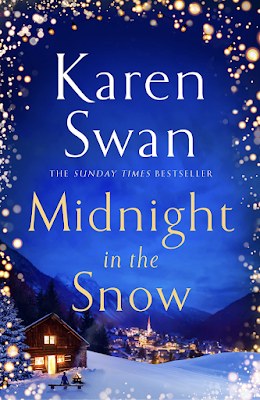
Award-winning director Clover Phillips is riding high when she encounters Kit Foley; a surfer and snowboarder as well-known for controversy as he is for winning championships.
Involved in an accident that had devastating consequences for a bitter rival, Kit has never spoken about what really happened that day. Determined to find out the truth, Clover heads to the snowy wilderness of the Austrian Alps, sharing a romantic winter wonderland with a man who can’t stand her.
But as she delves deeper, Clover finds herself both drawn to Kit, and even more convinced he’s hiding something. Is Kit Foley really as cold as he seems?
Christmas Surprises at Mermaid's PointSarah Bennett
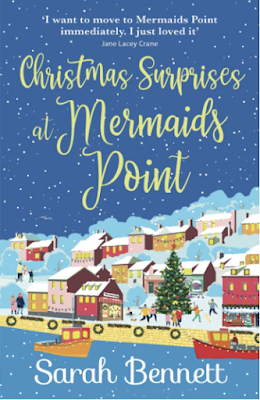
Christmas is a time for love, laughter, families and friends, and in Mermaids Point, everyone is getting ready for the festive season.
For Nerissa and Tom, this will be their first Christmas as a couple, but making sure they have time for each other, whilst blending their families, will take some careful planning. What festive traditions will they make their own?
Laurie and Jake are flat out running Laurie’s seafront café, packaging up orders of mince pies, sausage rolls and other delectable Christmas goodies, as well as finding time for Jake’s journalism. But when Jake’s mum offers them an unexpected gift, their plans are turned upside down.
Alex can’t help but be charmed by beautiful and talented Ivy, but he’s still recovering from his ex-wife’s betrayal and has a secret life he’s not ready to share with anyone yet. But as the Christmas spirit starts weaving its magic, Alex may find himself ready for love sooner than he imagines.
For Andrew, nothing is more important than family. As friends and family gather beneath his roof it's a time for reflection about what the future might hold.
As far as Nick is concerned, pop sensation Aurora Storm is the ‘one that got away’. After they shared a brief holiday fling, he has been thinking about her ever since. Is Christmas the perfect time to finally reach out to her, or is love at first sight just in fairy-tales?
Christmas Hope for the Steel Girls
Michelle Rawlins
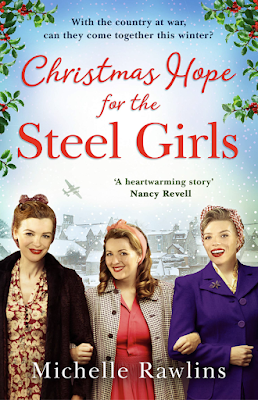
Winter, 1939
As December draws nearer and with her family facing their first Christmas without Bert, Nancy is desperately trying to keep up her children’s spirits and her own.
Young Patty should be excited to be spending her first festive season with sweetheart Archie, but why does she worry he’s keeping something from her?
Betty is missing her beloved William as he continues his RAF training but she’s determined not to sit around wallowing. In the midst of the coldest winter on record and with the introduction of rationing, times are tougher than ever but Betty has an idea to make sure nobody goes without this winter.
And with our Steel Girls rallying around each other, can there still be hope this Christmas?
The second novel in the new heartwarming Steel Girls series following our feisty factory sister’s bravery and hope during wartime.
From Shetland with Love at Christmas
Erin Green
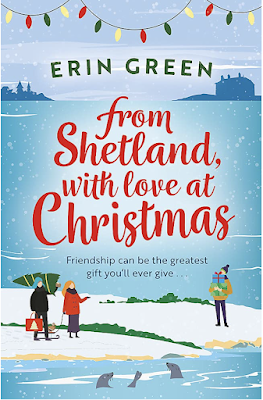
Verity is embarking on a better-late-than-never gap year now that her sons have flown the nest, and dreams of turning a lifetime's hobby of knitting and crocheting into a profitable new enterprise at Lerwick Manor's gallery.
Nessie has returned to Shetland after two years spent retraining as a blacksmith on the Scottish mainland. She's determined to do whatever it takes to reignite the traditional craft and prove that gender is no obstacle to taking on her family's heritage.
Isla is fresh out of catering college, but she is desperate to prove she has what it takes to run Lerwick Manor's artisan café. Focused on perfecting her grandmother's traditional recipes, Isla has no time for anything else - especially not her pesky ex.
With the island's Yule Day celebration fast approaching, it's the ideal moment for their crafts to shine. But they can't do it alone - and their friendship might turn out to be their greatest creation yet...
Poppy's Christmas WishesAnnette Hannah
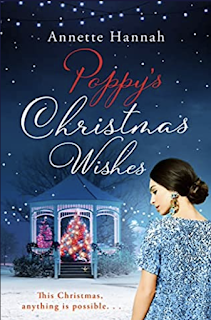
For the first time she can remember, Poppy is dreading Christmas. Unceremoniously dumped by her boyfriend after moving across the country for him, there's nothing cheery about the festive season this year.
Dragged to a Christmas ball by best friend Layla, Poppy meets gorgeous actor Gabe, who stars as a genie in a play. When he asks her what three wishes she would make, she realises it's quite simple: love, a job she's happy in and, just once in her life, to do something extraordinary.
Gabe and Poppy make a pact to help each other make their dreams come true. As they tick off their wishes, their friendship blossoms... But, as they discover, sometimes, what you want for Christmas isn't necessarily what you need...
And last, but hopefully not least...
I Wish It Could Be Christmas Every DayMilly Johnson

It’s nearly Christmas and it’s snowing, hard. Deep in the Yorkshire Moors nestles a tiny hamlet, with a pub at its heart. As the snow falls, the inn will become an unexpected haven for six people forced to seek shelter there…
Mary has been trying to get her boss Jack to notice her for four years, but he can only see the efficient PA she is at work. Will being holed up with him finally give her the chance she has been waiting for?
Bridge and Luke were meeting for five minutes to set their divorce in motion. But will getting trapped with each other reignite too many fond memories – and love?
Charlie and Robin were on their way to a luxury hotel in Scotland for a very special Christmas. But will the inn give them everything they were hoping to find – and much more besides?
A story of knowing when to hold on and when to let go, of pushing limits and acceptance, of friendship, love, laughter, mince pies and the magic of Christmas.
October 16, 2020
Easy Read...
I recently enjoyed a book so much that I was going to post a review up on Amazon and noted that someone hadn’t quite enjoyed it as much as I did. So naturally you have a look to see what that reader thought was wrong with it. Then you check out the many other reviews out of interest, the massively wide spectrum of opinion… then your eye snags on a phrase that keeps cropping up.
‘An easy read’.
I confess when I saw that placed as the title of a review, I expected it to be a bit sniffy. On the contrary, the review was very complimentary. But my head had gone down a side-street with this one. Why was I conditioned to think that ‘easy read’ was a bad thing?
I think of an ‘easy-drinking wine’ as one that’s a bit insipid, that it’s not great, it’s not going to set my tastebuds on fire… something I could just drink without bothering to savour it, because it’s there. ‘Easy listening’ music to me is music that I hear but don’t necessarily listen to. It’s in the background, non-demanding of my attention. Easy has somehow become synonymous with ‘bland’ for me. I can’t remember ever using it in a complimentary way to describe a book.
I did a bit of digging. It seems that we have quite different views of this two-word phrase. ‘Easy reading means anything that you’ve enjoyed’ said someone. But could I honestly say that about Stephen King’s book Pet Sematary, a book I couldn’t stop reading and consumed in a single day? I wouldn’t call it ‘easy reading’ though I’d golloped down every single word.
Here’s what some said about the phrase ‘easy read’ and you can clearly see the conflict.
…suggests the writer has just churned it out with no effort
…takes skill to write an easy read
… means low brow. An insult
…means the reader was engaged and kept turning the pages
…insinuates it’s an ‘easy write
…better than being described as difficult which would put readers off
…is a compliment though I have to caveat it in case people think I mean it’s not well written
…means it’s a book I will probably read all day because I’m so caught up in it
…I get called this all the time and it’s hard to take as a compliment. I feel more as if they are saying, ‘next I will attempt joined up writing in a sentence’ (Ha!)
…it’s flattering. It means people can really engage with my books
… I often think it’s intended as a diss
… it means something not too challenging
… it’s an insulting term, as if the book is of a lesser quality to others
…I find the term slightly condescending
…’If you’re thick’, is how I hear it
… easy read suggests to me that the use of language is simple, the plot is basic and the themes are weak
…I’m always accused of being an easy read – or a guilty pleasure. One reviewer said ‘She’ll never win a literary prize, but I couldn’t stop reading’
…I suppose it’s better than being described as tricky, arduous, difficult read
(I’d argue that ‘easy read’ and ‘difficult read’ aren’t true opposites…)
… I don’t think anything, apart from Ladybird books for three-year olds, should be classed as easy reads. It’s insulting
Is ‘easy read’ the equivalent of Dolly Parton saying ‘it takes a lot of money to look this cheap?’ asks one writer. Books that flow are hard to write – like Katie Fforde says, ‘…it’s a funny one. I do find it a bit sniffy, but I do always aim to be easy to read. I reckon I do the work so my reader doesn’t have to’.
So it seems that ‘easy read’ doesn’t necessarily mean it as an insult to the writer. They’re not saying it’s taken no effort, maybe even they’re insinuating quite the opposite. But then again, it can be taken that way, the phrase is a little loaded. It’s that word ‘easy’ I think. It has too many negative connotations that you find without having to mine too deeply. If someone (mainly a woman – yawn!) is easy, that’s far from a compliment. Easy = no effort. Sometimes things can be so easy there’s no fun in them. They’re no challenge at all. Brain baked yet?
Maybe it’s a contextual thing, as someone said, ‘depends what comes before/after the phrase.’ And they’re right, because the sentence in which it’s couched will determine if it’s a compliment or an insult.
‘An easy read which is instantly forgettable’
…is a world apart from
‘An easy read that I devoured whole’.
Maybe it’s a perception problem. Those of us who have seen that word ‘easy’ too many times as a negative will read ‘easy read’ as a negative (like me) and vice versa for others.
It seems that many authors see it as rather dismissive while most reviewers use it as a compliment, though – as is clear – not all. Plenty of authors accept it as a positive, some reviewers use it as a deliberate slur. But ‘page-turner’, ‘unputdownable’ and ‘compelling’ don’t seem to have any of those negative connotations; you’re in no doubt that you’re turning those pages or can’t put the book down because you can’t wait to get to the next bit. That’s a really good thing, no ambiguity, no sly insult.
I’ve had the ‘easy read’ thing levelled at me more times than I can count. It sits in the same family as ‘light read’, ‘a beach read’, ‘a cosy read’. Out of all of those the last one would be best for me, but when I put it out there, I was met with the comment: ‘that’s like one of those specific cosy mysteries that I’d avoid’. I’ve read a lot of books in my genre that may have that old happy ending, but in the pages leading up to it there is domestic violence, abuse, cruelty, emotional breakdowns… everything short of buggering a Shih Tzu – and yet it’s as if everything is judged on the final scene of two happy protagonists so it’s okay to dismiss it as a ‘light read’. Likewise ‘beach read’. My idea of a book to take on the beach is a psychological dissection of a serial killer. Yet I’ve never seen ‘Beach Read’ on any review of ‘Killing for Company’ or a biography of Fred West.
I have no idea why I picked up on all this. I have no idea if it even really matters, but something drew on those two words in mental highlighter: ‘easy read’ and my brain started to fry.
But I did see this too.
‘If an easy read is where the words and meaning fall off the page so the reader doesn’t register the process, I’m all for it,’ which I thought was utterly charming.
And of course we are living in strange times where everything is totally tits up. On that theme a couple of people – both readers and writer said that the term was…
‘…Sniffy if in a review, but conversely, if someone recommended to me a book as an easy read, I would grab it with both hands right now.’
Maybe it’s wrong to put those two words on trial with all that’s going on around us. Maybe if what is really meant by ‘easy read’ is a book that transports us away from the cloud of gloom which is not only above our heads but has descended and is swirling around our feet. A book that drags us into its pages and keeps us as willing captives because the story flows ‘with ease’, and leaves us with a sense of peace that's as ‘easy as Sunday morning’ is a quite nice judgement. Easy Read: a phrase which can be used for slight or praise, but if used as the latter at the moment, in this climate, maybe it’s really not that bad a tag to have after all?
But I’d still rather have ‘unputdownable’. You know exactly where you are with that.
September 12, 2020
What a Flipping Weird Book Year (and a special offer for people in the US)
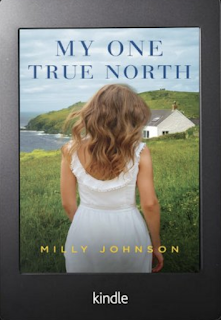
My One True North came out in what should have been the biggest year of my career. Just before the world went bonkers, I'd been awarded the Romantic Novelist Association's Outstanding Achievement Award which lifted me from the most severe depression I've ever had following the death of my father. I can honestly say when I was doing the speech, all I heard was a pin drop silence that I took for boredom and at one point I can been seen flicking through the speech to see if there was any way of cutting to the end. I wasn't prepared for the reception, I was humbled by it. Many people have presumed that My One True North was written when I was grieving dad. The story is, after all, about traversing the cold lake of grief - easy assumption. But quite the opposite is true, it was written before dad was even ill. I found myself stepping in the footsteps of my characters, having to pick something for dad to wear to meet his maker (I can't tell you how long I laboured over his socks). It was life imitating art and my only consolation is that I got it right, I got it on point what a truck travelling at 100mph to the head grief can be. But it was never my intention that it was a miserable book - on the contrary. If you tackle something as heavy and dark as the loss of a partner, then you need lots of humour and lightness whipped into the mix. And as I was writing the book, I was aware that it fell quite naturally into four stages: the lowest point, a dawning of light on the horizon, an autumnal breeze of change blowing out the old so that new life had clear passage to grow - and finally an upward surge. It was like four points of the compass: South, East, West, North - in this case 'The Northern Lights'. North featured heavily, not the least because that's where I come from. But the true north... the idea of fate interfering, overriding circumstance to put people together - for them to find their true north in each other.
Some have commented that there was no epilogue with this book. (Funny because if you do write an epilogue, some people complain that you've spoon fed them conclusions they were grown up to reach themselves, thank you... you can't win!) I will continue to write epilogues if needs be, but in case you're asking, there's no epilogue in this one because when I tried to write one, it felt as if I had left the characters where they should be and must leave it there because anything else would work against it. It didn't feel right to add anything else, it ended when it ended and in my head it was the perfect point to say goodbye with a spectacular scenic finish.
I was lucky that I managed to have a hardback launch for this book before lockdown, where so many of my friends didn't manage it for their books out later. I was lucky that the supermarkets, who had cut down on their books offering, took mine by the thousands and it stormed the charts and stayed in them for weeks - my longest 'tail'. I felt privileged to have more letters than ever before that this book about two people grieving their partners who find friendship with each other and a motley group of people travelling in the same grief boat, gave respite to worried minds, took people away from the mess happening in the world. Books can work with the tide or against it, and the trouble is we never know when or in which direction those tides are going to flow so there is alchemy at work with book success. A book with a sad beginning could have floundered in a climate where people were looking for jollity, but mine didn't. The tide worked in my favour. This job is often about luck as well as hard work.
I should have been in a radio studio with Graham Norton to advertise the paperback, I should have been at parties and touring and readings and celebrating the biggest book of my career... but instead I had to sit in my office and connect to people via Facebook Live. It became a weekly event - just me and a cup of tea and a bun, talking about all sorts of very little news but somehow that worked too. It gave people a sense of connection. That for an hour each week, we were all pals in a virtual front room, chatting about the little things not the great big elephant in the room as, for that hour, it had been banished to the shed. I enjoyed all those sessions. I enjoyed writing jokes and making them into mini videos and posting them 'The Daily Jolly' I called them. As authors we have to keep the plates spinning, we have to keep saying 'Please buy my book, this is my job, I have a mortgage' and we had to invent other ways of spreading the news about books we had worked on for the best part of a year. We couldn't afford for them to be pushed out into the sea only to sink like a boat with a hole in the bottom.

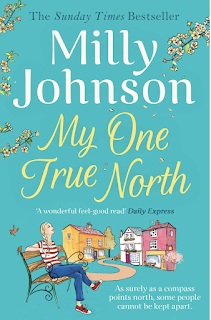
And I had to put my creative head on and write the book that I'm about to bring out in just under seven weeks now. I Wish It Could Be Christmas Every Day (across social media as #ChristmasEveryDay) WAS written just after dad's passing, unlike My One True North.
Timing is everything and this book wasn't the one it was originally meant to be. I've had the title in my head for years. It was originally going to be a sort of Brigadoon where people find themselves in a place where it is Christmas every day, literally. But I couldn't make that work. Had I written it weeks later, when the pandemic hit, it wouldn't have been the book it is today either - because the idea of setting a story in a place where people are effectively locked down, would have been the last thing on my mind.
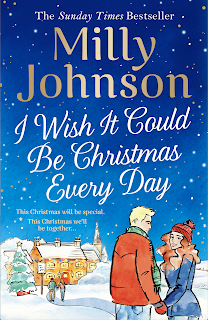
I wrote the first draft in less than three weeks flat. I didn't want to talk to anyone in the new year, I just wanted to write. I immersed myself in a world of snow and let my brain guide my hand hoping it would come up with the goods. And it did. And whereas My One True North has a big cast, big scenes, lots of action, this one has a stripped back crew and one location. And I think it's the best thing I've ever written because of the emotional punch, no doubt dredged from me because of what was going on in my own life. I needed to give myself some hope and redemption with this book. I needed friendship and romance and kindness and resolution. I needed to work a lot of stuff out of me via my characters - writing really is the best sort of therapy. And I can't wait for this one to come out. Even though I won't be having my launch parties and my signings, I hope this one drops into shopping baskets everywhere and people find, within its pages, exactly what they need to find in these times... that it doesn't take much to have fun, that life is here and now and we need to enjoy it in the moment and not put everything on hold until times are better. That it is people who count more than things. And that snowmen poo marshmallows.
This is the story of six people.
Bridge and Luke who have been battling for five years to end their marriage. They've both moved on and found a way to part via a no fault divorce. All they have to do is meet, sign a piece of paper each, swap them and be on their way - never crossing paths again. But an unforecasted bout of snow means they have to take refuge in an old inn on the North Yorkshire moors and spend far more time with each other than they'd planned. Plenty of time for dangerously cosy memories to rise up and engulf them.
Mary is the 'invisible' PA to Jack Butterly, owner of the hugely successful Butterly's Scones, a man who Mary has been secretly in love with for four years. She has volunteered to drive Jack to a country house hotel where they will spend the night before the next day's early morning meeting, knowing this is the best chance she will ever have of getting Jack to see her outside the job. But the snow alters their plans and they too are forced to hole up in the Figgy Hollow Inn. What happens when Jack sees this capable young woman through the eyes of others?
And Robin and his husband Charlie are on their way to spend a five star Christmas in a top Aviemore hotel when they too have to seek refuge in the inn and forsake their water bed and seven course Christmas dinner cooked by a Michelin-starred chef. It's a disaster... or maybe they find everything they were most chasing with new friends and a log fire instead.
I think out of all the characters I've ever created, these are my favourites. They became so real, so rounded, I loved them. I loved watching their friendships grow, I loved writing their energy and laughter and banter. I even loved eating their food.
This horrible, awful, sad year has spawned a book I'm so proud of. I hope you take it to your hearts and it gives you pleasure, fun and respite. And with equal starring roles to the human cast are diamonds, scones, broccoli, tins of tomatoes, snowmen, Christmas crackers jokes (of course!) stockings, carols, radios... and an awful lot of food. The only thing missing is Rudolf. And I'm really annoyed at myself that I forgot to shove him in somewhere!
Enjoy! xxx
February 22, 2020
The Power of Kind Words
Guess what - we authors feel very deeply, we mine into our emotions and that's what makes us write the words that affect our readers, make them laugh, cry, rejoice.
Words, are powerful tools. A simple ‘thank you’ – said or withheld – can change the course of someone’s day, often beyond. But with power comes great responsibility, as Spiderman’s uncle once said. Words, as we are seeing more and more, can pull someone back from a brink ...or push someone over it.
Where once upon a time we might have shared a discussion about someone on the TV with a friend, we now use the internet as ‘a mate’. We parade our feelings about people we don’t know – to people we don’t know. Some might say ‘we have freedom of speech so what’s the problem with that?’ Well, just because you can write something, doesn’t mean you should. The internet has stripped away our awareness of empathy, how much we can affect other people with what we do.
We’ve all done it. It’s too easy, too habit-forming. We’ve all thought ‘Jesus wept’ when we’ve seen someone a bit non-conformist on Only Connect/Love Island/Question Time. Some people take it to extremes, want to grind someone they can’t stand underfoot, even though they’ve never met them or are likely to. Most of us have taken to Twitter at least once to parade our observations to people we don’t know looking for what - affirmation that we’ve got our thoughts right? Until you’re at the receiving end of a trolling you have no idea how much those comments wound. We have developed a thirst for hate, Twitter has become the gladiatorial arena and anyone in the public eye is a potential bear to be poked with a stick for entertainment. No longer do we just turn to our partner in the lounge and say ‘look at the arse on her’, we have to submit our words to the internet where the person with the big arse might see them, even copying in the generously proportioned person to ensure they see it – possibly even adding a hashtag to make extra sure. What have we gained by going that extra distance to the keyboard and doing that? Do we go to bed happier for it? Do we think what effect our words might have on that person?
We live in a negative age. We are more likely to rage online about a meal we’ve hated than one we have loved. Maybe it’s time to flip the coin. Maybe it’s time to reconnect with the kindness inside us – a quality that is often mistaken for softness and weakness, not for the strong, life-changer… life-saver - that it can so often be.
Words can be gentle hands or weapons, and we are producing a generation who see cyber-bullying as the norm. Schools should be teaching their pupils how to use words with care and thought. It’s too easy to hate. It’s too easy to think that there is only one opinion on anything and it’s mine and it’s the right one. Once upon a time there was healthy discussion, now a difference of belief is tantamount to a thrown-down gauntlet. There seems to be a culture of ‘I believe in peace and love and tolerance to all people, unless you think differently to me then I want to kick your head in, you f-ing cow’. One careless word, one thought voiced in error leads to outcries to ‘cancel’, to extinguish a person’s career, to take away their livelihood and profession in a world where the goalposts are continually moving. ‘Queer’ was a word that not so long ago had been thrown into the insult jail, now it has resurged and labelled as de rigueur. The world feels like a field full of eight foot pot-holes full of dissolving acid. No wonder anxiety levels are at an all-time high. Maybe it's time to take a moment just before you put finger to keyboard to type in something derogatory and think what negativity you are releasing. Maybe think of that tweet being directed at you and how you'd feel reading it. No surprise then that the sales of the books us commercial fiction writers pen are rising. Our books full of kind people, friendship, love and acceptance, fictional communities who pull together and bad guys are thwarted. Does this not signify a clear desire for millions of readers to escape this hard and unforgiving world? Or maybe to find hope that kindness will somehow leap out of the pages and become real?
There is no word for our genre of fiction – one primarily written for women by women – because no label really fits which doesn’t sound dismissive. (Femme Fiction?) Chick-lit has become a derisory term and in no way describes the depth, the intricacy and craft of our writing. Women’s fiction (note: there is no ‘men’s fiction’)? Somehow it sounds sniffy, as if it is fit only for creatures with smaller brains and intellect; something for the little lady to read inbetween doing the cooking and washing, as if our lives are less important somehow.
('I don't read romance, I read proper books.' Like Doctor Zhivago. A love story. Hang on... it's by a bloke. Let's reclassify it then as an epic masterpiece.)
Whatever you call them, our books have the power to transform, to cheer and inspire, to act like aloe vera on troubled souls. In our works women find templates of healthy relationships, solace, motivation to change their lot. And they do, because they write and tell us about it. Though I don’t think any of us set out to do this when we write our manuscripts. Our aim to entertain and tell a story often ends up having a massive influence on someone who desperately needs direction – and finds it within our pages.
Maybe it is time for life to imitate art. For kindness and forgiveness and acceptance to be allowed to flower instead of being stamped out by big boots of intolerance and literary snobbery. Until it does, we shall continue writing our tales of nicer worlds, of hope and happy endings which are within the reach of everyone, our ‘little women’s’ books which seemingly have a power not to be sniffed at.
Why I Wrote a Quick Reads Title
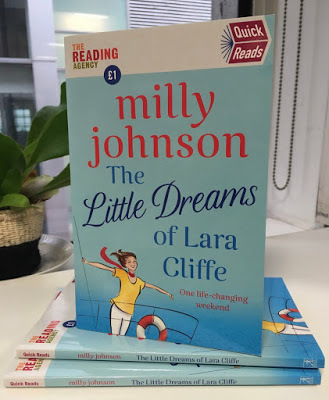
The literacy levels in this country are appalling. One in five adults have the reading age of a 5-7 year old. Sorry, ignore that – it’s gone up to one in six. About eight million people in the UK. That means they can’t read the instructions on a packet of tablets or a simple road sign. Because we don’t just read for leisure – reading is a life essential skill and its effects are far-reaching.
Why did I agree to write a Quick Reads book? Because I was asked. Simple as that. Except timing played a big part because I’d just been into prison to give a talk to the ladies in New Hall about my career, hoping to show them that small life changes can lead to big changes. I met women who were determined never to enter the prison system again after being released. But without skills of reading and writing, they would gravitate back to their small, familiar but dysfunctional circles, from which they might have had a chance to escape had they been more literate. Reading really does transform lives.
Once upon a time, adults who sought help were given the equivalent of Janet and John books, children’s simple stories which did nothing for their already low self-worth. Quick Reads are a selection of stories written by best-selling authors for adults. We’ve all taken care to deliver tales which read every bit as well as our longer novels because we want to encourage not to patronise. They look like books for adults – because they are books for adults, with adult themes and language. The only difference is that they’re shorter, the sentences aren’t long and complicated and full of clauses and the vocab is simpler. Why use ‘discombobulate’ when ‘confuse’ will do the same job? I defy anyone to read one of our books and spot any real difference - a whole load of people front stage and behind the scenes have taken care to make it so. They’re directed at adults who need help to build up their reading skills, who are off-put by thick tomes of dense passages, but they’re available to anyone and the font is slightly larger too for those with reduced eyesight. Perfect for a ‘quick read’ (see what I did there) or for those people who have suffered a stroke or have an illness which means a shorter more easily absorbed story is preferable. Jojo Moyes calls it a ‘gateway drug’ and she’s right; it is a perfect taster for the rich world of books out there, all waiting to be read.
Personally, I can’t remember a time before I could read and I’ve always taken this wonderful skill for granted as much as I have breathing. The prison visit made me think long and hard how essential it is and I spent a day away from work writing down all the instances when I read something: cooking info on food packets, the dosage instructions on the dog’s medicine, a form to fill in to apply for mum’s attendance allowance (29 pages long), a train timetable, a text to a friend... so many occasions where I needed to be able to write and read. Being able to utilise these skills opens up a door to a much bigger, more satisfying – and safer - life.
We absorb so much vocabulary and information without even trying when we read. People equipped with a wider store of words are more confident because they feel able to interact more with others and are better equipped for what life throws at them, they’re more resourceful. Those with better literacy skills get better chances, better jobs. It can be no surprise that there is a correlation between a restricted vocabulary and low self-esteem.
Reading is a magnificent sleep aid. It rests and relaxes a brain, powers it down.
Reading also sharpens our ability to focus and concentrate, skills we are in danger of losing with this modern technological age which presses us to multi-task. We watch TV whilst texting or checking in to see what other people's take on things are on Twitter. When we go to watch a band, we record it on our phones rather than just being there in the moment and enjoying it first-hand. Reading demands our whole attention to make sense of what is going on. Being forced to do one thing only but properly lessens our stress levels – no shit Sherlock!
Reading switches our brain into the mains, gives it power, improves memory function, staves off dementia. It’s a ‘use it or lose it’ muscle that needs stimulation.
Reading gives solace and escapism for people with anxiety, the poorly who need to forget for a couple of hours that they are hooked up to a drip. It distracts from stress.
Reading a good story can do what no film can: allow a tailor made hero and heroine fashioned from our imagination to play out the story in our heads. How many of us watched Fifty Shades of Grey and thought ‘Nope, didn’t imagine Christian like that’? It’s a lovely, gentle pastime. One in three adults do not read for pleasure. What a travesty.
Reading educates us as we read factual books about the experiences of others, makes us see what is possible, encouraging us to make changes for the better. Reading gives people insight into what healthy relationships should be. I've had more than one letter from a woman who didn't realise she was actually living in an abusive relationship until she read objectively the experience of one of my characters and the penny dropped. And she got out. Reading gives us a wider understanding of the world in general. It reminds us of the impact of people’s actions upon others; prompts us to be mindful of the pleasure we can give, or the harm we can inflict. More on that one later.
Reading is free if you use the library – millions of books out there to improve and lengthen your life for the price of… well… absolutely nothing. Quick Reads books are there in your libraries now – or in bookshops for a very paltry £1.00 each.
There are wider implications upon society for reading. Being literate unlocks more chances in the job market. More vacancies are filled. The pressure on the welfare system is relieved. Literacy improves confidence, lessens stress – that impacts on the health service which is groaning under the weight of patients with mental health issues. The economy benefits, crime levels drop. All from people being able to read a little more.
Our education system is suffering. Excessive accountability and figure/target satisfying, the pressure for data dumps has been taking our teachers away from teaching. Grass roots: children need to read and write adequately because almost EVERYTHING in their future adult lives will depend on it. Government, let our teachers flipping teach – that’s why they joined the profession in the first place. And these days if there isn’t already, there should be a component to the curriculum on how to use language in this techno age. Responsibly. Not purely for trolling on the internet. So why oh why was the Quick Reads charity ever in danger? Why did it have to be rescued by one woman, the far-sighted philanthropist and author Jojo Moyes, when publishers could have clubbed together in a joint venture or – preferably – the government could have stepped in to pledge money to keep it open. It would have been cheap at the price for the savings they’d have made elsewhere. This is base level stuff. It doesn’t need a team of financial experts to see the return they’d get for their cash. There are only advantages to learning how to read. Reading is a key to a life enriched. A life enhanced and changed, a life happier and more fulfilled, a life with more choice and less stress. And it could – and will for many – start with a book priced at a quid. Tell me a better investment than that?
More information about the Reading Agency can be found here.

December 27, 2019
Dad
I’m sure it took dad a long time to be able to work out what strange creature he had sired. One who didn’t think sorting out a pension was a priority, who baulked at the idea of a steady job with sick pay in favour of the wild west of careers: the crowded waters of writing commercial fiction. We didn’t always see eye to eye but never enough to fall out. He must have despaired – albeit quietly – as I made so many mistakes but he never interfered, just let me get on with it all but he never let me down when I asked for help. And because I was divorced when my sons were tiny and they never saw their father again, dad was their role model of a patriarch. A man with a pronounced sense of right and wrong. A man of quiet honour. A knight of good manners and decency.
Dad was generous but he didn’t splash his cash. When my other half once bought me a Mont Blanc pen for Christmas, Dad’s immediate thought was, ‘How much will the bloody refills for that cost you.’ And when I tried to show off my new blue, beautiful Mercedes a couple of years ago with every feature known to man, Dad stared at the gorgeous walnut dashboard and he said in a horrified voice, ‘There’s nowhere for you to play your cassettes!’
I did try and drag him into the 21st century. I bought him an iPad for his 80th birthday and he gave it back to me after he’d spent hours trying to turn it on. He was quite happy in the 20th century thank you with his cassettes and his LPs and his gadgets from Richer Sounds. Never did he come home from Leeds where he worked without buying a gadget. He had more Walkmans and headphones than Dixons (‘Dixons’ became his nickname). I did convince him to get a mobile so I could pick him up from various hospital visits. He had one number in the memory – it was mine. He turned it on to ring me and then straight off again when he’d rung so you could never have got him to answer a call. A ten quid phone card lasted him about five years.
One day when I was a teenager I walked in to find this beautiful old typewriter on the table for me. My dad had got it from work because they were giving it away and he knew I’d want it. He carried it to the bus halfway across Leeds, sat it on his knee all the way home and then nearly broke his back carrying it from the motorway because it weighed a ton. There was no fanfare, he’d just got it for me because he could. I walked in and my jaw dropped when I saw it because it was the best thing in the world, the ultimate in gifts that matched the recipient. I didn’t think he ‘got me’ but that precious memory reminded me over the years that he did.
He was stupidly independent, didn’t want to put anyone out. So he’d not tell me he had a hospital appointment and he’d tell mum not to tell me but as he’d set off for the bus stop mum would ring me and I’d get in the car, race down the road and pretend I was just passing so I could take him. We did this so many times he must have thought I was psychic.
I’d got so used to taking dad to the hospital, sitting and waiting whilst various bits of him were prodded and poked to find out why he didn’t want to eat. He had cameras up and down him, blood tests, scans… results all negative. He never said that he was worried about what they’d find, never gave a cry of relief when they hadn’t found what he was convinced they would.
The end, when it came, was like a two hour film condensed to a clip. He went in to hospital yet again with a debilitating backache. The medical team found his heart rate twice what it should be working overtime to compensate for other things going wrong. The backache went, the heart rate stayed high. The docs negotiated a maze of treatments trying to sort problem A whilst not inflaming problem B and setting into motion problem C. We went from expecting dad to come home as soon as his heart rate came down, to find that other problems had shown up, to hearing that the palliative team were being lined up to being told, ‘your father is dying’ in a space of a few days. Dad, the docs said, had been living on a knife edge and one condition too many just sent him over the top. Throw in a blood condition that made infection hard to fight off. Ironic that my dad had given blood so generously for so many years and yet at the end his own let him down.
I can’t begin to relay how hard it is to watch someone so mentally strong have moments of delusion and fear, a glimpse into a world that too many people have to inhabit of their parents crumbling from the inside. We were spared that protracted horror. But seeing the textbook breakdown of him, a Benny Hill speeded end – just enough time to say your goodbyes, not enough time to get our heads around it… was the hardest thing of my life. We didn’t do slush, but a friend of mine told me to make sure I said the ‘I love you’ words, however daft they sounded, and I did and he said them back. He was terrified the attached drips were prolonging the death he’d been told were coming, I was terrified when the drips came down, the monitors switched off, the sticky pads on his chest removed. I made sure I told him that the typewriter was the most wonderful present I’d ever had. When he slipped into semi-unconsciousness, his hands were typing as if he were dreaming about it.
My first thought was to have him at home but I was wrong. Mum and I sat by his bedside from dawn to long past dusk for days and days and days and could monitor how his pain relief was working, rush out for a nurse when the medicines started to fail. The worst part was witnessing his mental anguish, his frowning, banging his forehead and because I know how his brain works, I knew what was going on in there: he’d looked after mum and me since we came into his life and he was going first. That thought was both killing him and making him cling on.
We live five minutes away from the hospital. He slipped away very quickly at 4.30 in the morning, we dashed up there but missed his last breath by minutes. I shan’t beat myself up about that because I’m pretty sure dad wouldn’t have wanted us to witness that. I was just glad he wasn't alone, that a lovely young nurse was sitting with him. He didn’t like to put anyone out which is why if he could have planned it, he’d have worked it around Easter, Christmas, Father’s Day, Mother’s Day, birthdays… but some things you can’t play to a diary.
I don’t know if it’s ironic that my next book was written like a forerunner of what I was to go through – choosing what clothes for a deceased person to wear, the songs for the funeral, keeping everything as is in the house as if they’d just popped out into town, slippers by the door waiting. Throw in wandering like a zombie around Meadowhall looking for a plain black coat and dress. In my case whilst every shop I enter is blasting out the old Christmas favourites by Slade and Paul bloody McCartney. Never were two worlds so incongruous. On 12/11 I was celebrating my parents Diamond Wedding with them, looking forward to Christmas, mum bragging about her card from the queen, popping the cork off a bottle of champers. On 11/12, I was delivering clothes at the funeral parlour for dad to wear.
Grief, I’ve discovered, distorts time. This three weeks since he passed has felt both like years and hours. It’s like a Funhouse without the ‘Fun’ part. A few steps on sure ground underfoot before the room starts whirling or you fall through a hole. Nothing is solid, my world has changed shape. Triggers to bouts of overwhelming sadness hide behind corners ready to leap out without warning and don't necessarily have any apparent relevance. The finality of it all is the hardest to bear – that I will never see my daddy again, never see him strolling up the road so I can pull in to give him a lift, though my mind has already started playing tricks on me and spotting him, even though the ‘him’ is nothing like him at all, just a man in a flat cap walking where he used to walk. My recent memories are full of vignettes, of throwing my arms around a coffin and sobbing into the wood, of rolling a toothbrush around my father’s mouth to moisten it because he was too weak to drink, of hovering over my father's bedside as if he were my child and throwing the rightful order of things out of the window. Of riding in a black limo behind the hearse and thinking how many times I’d seen one on the street and wondering who had died and what their story was. I felt strangely calm until the car turned into the crematorium and I was floored with the impact that it was us taking centre stage and all those dear old friends that I had seen so many times over the past few years when I’d taken dad to funerals, were lined up to say goodbye to him now. Surreal is the only word that comes near to summing it all up. I keep thinking this can’t have happened. It hurts too much to accept that it has and my brain is doing everything it can to repel the facts. I cannot refer to dad as ‘was’ as opposed to ‘is’ ; for such a little three-letter word ‘was’ has a dreadful power.
Whilst looking through old photos, I came across one of mum and my godmother that I've seen so many times over the years but none of us ever spotted that in the background there was dad carrying me. Someone said to me that it was a sign... that he was there and always would be, in the background caring for me. It's the sort of thing I'd have dismissed as sentimental bollocks. Now, it brings a strange solace because you take your comforts where you can find them and I'm scrabbling around for all I can get my hands on.
There is a piece of me missing. I will adjust, regroup, recalibrate… because that’s what people do. But I will not be the same person ever again and I don't know if I'll be harder, stronger or weaker but time will tell. One day I will be able to watch the full Andre Previn/Morecambe and Wise sketch and think fondly of dad splitting his sides at it every single time without experiencing a hard pang of loss. I hope. All I know for certain at the moment – and it’s a cliché, I’ll give you that, sunshine – is that the world is a little poorer for not having more tolerant, kind people in it like my father with his cassettes and his quiet, innate decency. He was, quite simply, a gentleman. And I’m not sure I will ever get to the end of missing him.

October 17, 2018
The Process of Writing a Book When You Are Chaos Personified
How do you write a book, people ask me. Well this is what I do. There is no right or wrong way, just your own way. My way is anarchic and chaotic but it works for me. I cannot understand how most of the following happens, it just does. I will not be holding seminars on how to do it this way - but it is here for your perusal.
1 My editor asks me for a synopsis of my next book. I am not a planner. All I can give her is ‘The lead characters are X and Y and they live in Z. They get together at the end.’ She needs more so I make something up. The finished story will bear absolutely no resemblance to this synopsis.2 I try to plan my book this time. I take out a fresh block of post-it notes and write some details on them and stick them on a wall. I see the joy in being able to do this and move them around purposefully and I want to employ this process SO much but I can’t make it work for me. The few post-it notes stay on that wall until they either drop off or the dog nicks them to chew on.3 I start to write. Chapter 1. I break that sea of white with one word and one number – I’m in. I have no idea where the story is taking me but the lines cue up in my head and I just carry on writing until I realise it is time to feed the dog/cat/rabbit/teenage boys or wee. Occasionally I will have an idea about something which might happen further down the line and I jot it quickly down in a notepad. Or, if in the middle of the night, on my arm. 4 I need a title because it has to mean something and the title has to be relevant to the book and blended into it, as surely as sugar is folded into egg-whites to make a meringue. I am always a lot more relaxed when I get the title which either arrives in a blinding flash of inspiration at the beginning or a whirl of panic at the eleventh hour. Usually the latter.5 About a third of the way in I realise I hate the book. I have no idea what is going to happen next and I don’t know my characters well enough to have any opinion of them other than I hate them as well. I have been here enough times to realise this is not a brick wall but an illusion – it is fog. If I power through it, there will be light on the other side. There always is but in the thick of it, it is scary and I worry that this will be the time when the fog really is a brick wall. 6 At the other side of the fog I am more invested in my characters. I begin to like them a bit and know what makes them tick. They oblige me by helping me progress the plot. Nice characters.7 I do not edit along the way. I complete the first draft. The first draft might have seven Saturdays in February and Andrew in chapter one has become Darren by chapter seven and Siobhan by chapter twenty-five. Green-eyed Mary might have blue eyes by the end of the book – and possibly brown ones in the middle. I don’t care. I do not edit here.8 I HAVE COMPLETED THE FIRST DRAFT. TREAT TIME. Sparkling ice wine is ordered. I deserve this lots.9 Second draft. I make a timeline. Easiest way to do this is by running off a calendar that I can write on, pin point on it where my last chapter ends, then I work backwards. Shape is happening. I now only have 4 Saturdays in February. 10 No title yet? I start to twitch a little.11 Third draft. Continuity. Mary’s eyes are sorted out. I make sure that the features of my characters are set in stone. Darren is Darren at the beginning, middle and end of the book and maintains his brown hair and 5ft 7” frame throughout. 12 My work goes off to my editor. Whilst waiting for her to come back with her comments, my stomach is in spasm hoping she will not say ‘This is absolute crap, start again.’13 My editor returns the manuscript, tells me to strip out a murder, cut back on Darren and beef up Mary’s story. It feels a mammoth task. I have to cut, whip out, add in and stitch up my story into a different whole. Somehow this happens.14 I send it back to my editor sort of assured that we are on the same page (chortle). If we are…. Thunderbirds are go!15 If that title hasn’t come yet, I am now flapping like a flock of sea eagles. My editor and agent and I bat titles back and forth. I despair. Four hundred suggestions and none of them fit. Some are actually so bad they make me vomit and have bad dreams. We need a title urgently.16 WE FIND A TITLE. I can sleep. Wine helps.17 Having had a couple of weeks away from the manuscript, when I see it again I spot mistakes and plot-holes everywhere. I work on getting these right and anchoring that title deep into the story.18 I then do another draft where I enrich the language, deepen the emotion, this is the fun edit. The one where my creativity can flow. This edit is like the glossy top coat of nail varnish. It is as near perfect as I can get it. 19 Exciting meetings at Publisher HQ. So much goes on behind the scenes – PR ideas, marketing, sales. We sit around a table and they all excitedly tell me what plans they have for the book, which supermarkets and shops have bought them and how many. We plan and plot. It all feels real and wonderful – and we eat buns. 20 The cover comes from the art department and it is always a joy to see it. Except that the artist has usually gone off my initial synopsis, which as we know is full of lies, so a bit of tweaking has to go on.21 My work goes off to the copyeditor and comes back with a million notes on it. Mostly pointing out glaring errors that I should have noticed, and highlighting awful grammar. She is a marvel. I feel as if she should be writing the book and I should be cleaning toilets.22 Magic occurs. Something happens to my brain and it turns me into a copyeditor too now. A very anal one. This is usually panic-driven because I am terrified of overlooking errors. I trawl through every word of my manuscript, realising that I have written ‘just’ 42 times on one page. I take ALL the ‘justs’ out: 675. I read it again and have to put some ‘justs’ back in. My copyeditor’s hair turns white. This is my favourite part of the process because someone else reads it objectively in detail and you can work very closely with them as they are the first real pair of proper reader eyes. But you can work too hard on this. My copyeditor tells me it is okay to have a little natural duplication and working through a thesaurus changing every ‘said’ to a different word is counter-productive because the eye smoothes over many words that are doing a filling in job and don’t need to snag the eye. She’s right. Again. As always. 23 I like to look over the finished clean manuscript with all the mistakes ironed out. Still, you always miss a couple because you are poring over it so intensely. My brain now starts to wake me up at 4am. ‘Oy, Darren can’t be found in the park because in chapter 5 you said it was closed for a month.’ I have no idea how my brain does this but in the background it seems to be constantly scavenging for things to torment me with.24 I start to panic that there is a deadline and I’ve just discovered something that is out of place and it has a knock-on effect to other stuff. That deadline is too close. I have a massive repair job to do suddenly. My record is sitting down at 9am, determined not to go to bed until I had made sure everything was sorted. I was still there at 9am the next morning. I was still there at 15.45 that afternoon. My eyes were out of focus and watering and on the verge of bleeding. I put one foot on the step to go to bed as my son entered and asked if there was any chance of a bacon buttie. The answer was ‘no’. But with more ‘f’ sounds. 25 I back away from the book, off it goes to be typeset. Whilst I am in limbo I can catch up with some jobs like shaving my legs/moustache, talking to the family, drinking something that isn’t espresso. I try to relax and have a day off but I have lost the ability to know what to do with spare time. I start designing bookmarks/bags/pens. I am the Queen of Merchandise for this reason, because I am now obsessed with my book. I trawl the internet for promotional goods that will look good with a sunflower/owl/Christmas pudding on them.26 The typeset version comes back. I need to have an eagle-eye to spot any errors and really have to try not to alter anything that does not need to be altered. Yes, ‘packed’ would have been a better word that ‘put’, but keep it to the absolute bare minimum please. No one else will be thinking, ‘I’d have put packed there myself if I’d written that not put.’ I spend 15 minutes worrying if a sentence makes sense when a reader’s eyes would just drift across it. My stress levels are spiked. I spend half an hour looking at the word ‘was’ and thinking it looks as if it is spelled wrong.27 By now I am so sick of Mary and Darren I wish they’d jump off a cliff. Familiarity breeds contempt.28 The typeset manuscript is prised from my hands. It has to go to be bound into a book. NOW. There is no more time to edit. In the words of Frozen Elsa: ‘LET IT GO’.29 Another editor has also been looking at the manuscript to make sure all is well. She will flag anything suspicious. I love this woman like my own mother.30 The book is printed. I see it in all its magnificence and I am thrilled. Another to add to the shelf and I stare at them all and wonder if I really did write all those or am I actually the conduit for a dead spirit who was denied the time on earth and hunted around for a body with a vacant brain to write them for her. 31 Whilst I am preparing to launch the book into the world, I’ve started the next one. The editor asks for a synopsis…32 The book is sent off to some lucky (I hope) buggers. One can just hope that the first reviews in are nice as they serve as a suit of armour for that first ‘This is terrible. Do not waste your money’, which inevitably comes. I only look at the first reviews to make sure the book is hitting the spot. Yeah course. 33 Mrs Outraged writes a review telling people how appalling my book is and encourages everyone NOT to buy it. I look at her other reviews. If mine is the only one she has commented on, I presume she is an evil twat from my past. But no – Mrs Outraged has 500 other reviews to her name and she has hated the books of every other female writer on the planet, which gives me some comfort. Also she has called the Bible far-fetched and thinks the Brontes were talentless. Although she has given her wart remover 5 stars, so she can be pleased by something.34 We wait to see the public reaction to my new book baby. Will it make the top 10 - if it does… that’s bliss. The pressure is always on. If it got to number 5 last time, number 4 would be good. But then if JK Rowling has released 7 more Harry Potters on the same week as mine is out… my chances are the opposite of slim – they’re fat! 35 I have a busy schedule of meeting readers, signing their books, having pictures taken with them. It’s a joy, I feel exhilarated. I feel someone. Plus people give me a lot of scones. People feed writers and give them Prosecco. 36 I go home from being feted as an adored queen of romance to find that the cat litter tray needs changing, the ironing needs doing, I have no milk in the cupboard. And I have the next book to carry on writing…
June 1, 2018
Hello My Name is Milly Johnson and I am a Writer of Commercial Fiction.
Humour doth not automatically a light book maketh, so said Shakespeare or maybe I dreamt that. One Flew Over the Cuckoo’s Nestmade me snigger in places, but it was also one of the grimmest books I ever read. Life is full of humour, we need it to counterbalance the dark times. But, in this world, give a reader something to laugh at in a book and it turns it into ‘a beach read’ ‘easy read’ ‘chick-lit’. Unless you’re a man and then your tome is an ‘amusing literary classic.’ I had humour in one of my books alongside assault, racism and kidnap. ‘A light read’. Book by woman + laughter = froth. It would still have been judged the same had I thrown in a buggered Alsatian as well.
There’s a lot of snobbery in the book world. Women writers of commercial fiction – and I include the saga writers in this – feel it doubly. Had a woman written ‘One Day’, it would be consigned to the file of ‘chick lit’ but, guess what girls, we have a long way to go before the playing field is flat so just get on with your writing and forget the politics. The broadsheets will favour literary books for a long time to come... sea changes take time. Still, I can’t think of any writer I know who has an inverted snobbery about those books. We don’t look down on them because we don’t compare with them: they’re different. Which do you prefer – a fillet steak or a goosedown duvet? It’s not right or wrong to prefer one to the other. Steaks and duvets can co-exist happily in the world. It’s not a contest.
Predictable is another lazy insult if you favour a happy ending. A woman once wrote a review on Amazon that she could predict the end after reading four pages of my book. I asked her for next week’s lottery results (naughty Milly, do NOT leave comments). Well, yep, I ride that predictability bus. I like to leave people with some hope that their dreams can come true. Mine did. I dreamt of being an author. I dreamt of having £10 spare at the end of my pay packet so I could buy a weekly video. I dreamt of having my own office. I dreamt – big dream – of one day actually having enough brass to GO ON A CRUISE. I’m dreamt of meeting Mr Right and I did. I’m there. It happens, dreams do come true – as Gabrielle so rightly foresaw. Anyway – Agatha Christie is predictable: There’s a crime, Hercule or Jane solves it and the bad guy gets put away in prison. I can put up with that sort of bed-mate.
Commercial fiction holds its own against the insults and all those Japanese knot-weed rumours that it’s dying, that it’s ‘on its arse’. Actually, never has it been so strong. Never has the world, in such a total mess, needed commercial fiction as much to give brains some respite. And, in case you’re wondering, what I mean by commercial fiction is: books whose main purpose is not to challenge you intellectually or show off how many synonyms for ‘sybarite’ the author can muster up but books which give hope and comfort to people who need some time out of their zone, books that entertain and sweep up the reader into their pages. Books that celebrate friendship, community, love and family, that bruise your heart and then slap arnica on it, books full of characters that readers identify with – perfectly imperfectpeople who get their happy ending and make YOU realise you could have it too because carers of the elderly, teachers, dinner-ladies, people who work in Asda, stay-at-home mums all have a crack at a happy ending in life, it is not a prerogative of special individuals. Authors write these books primarily for readers to enjoy and their readers are legion and they speak with their purses. This is big business. It’s called commercial for a reason: because it sells.
But we live in an age where 15% of adults in the country have the literacy ageof an eleven year old. Surely making people feel ashamed that they like a story that doesn’t make them reach for a dictionary every second word is wrong. Surely a life-affirming story about people that readers can identify with is no bad thing? One that captures their imagination, has them reading on, improves their literacy levels because they’re so engrossed in a story? There is NOTHING WRONG with a book that is easy to read or has a sparkly cover that calls to you from a shelf in Tesco. Not everywhere has a swanky bookshop. Buying a book from a supermarket is no different from obtaining it from ‘Jago and Dashwater’ with its mullioned windows in the centre of Oxford (I made that name up). A book is a book is a book and commercial fiction books can change lives.
Readers of mine will be familiar with a story of a taxi driver that took something from one of my books that made him and his wife quit the rat race and live out a dream existence in a Inn in the most gorgeous part of France. And here are some direct lift from many of the emails that I’ve kept from people.
‘The Queen of wishful thinking inspired me get away from my controlling husband, I won't go into details, so after a horrible 9 months divorce is nearly complete along with moving into a lovely flat on my own hurray!! Just need a couple of rescue cats for company!!’
‘You wouldn’t believe it but we just literally booked a cruise in the Mediterranean for this September....You can take full credit for that!’ (ahem… I do)
‘I am sitting at the side of my husband who has dementia and your books take me to a place where I can breathe. Thank you.’
I know that a couple of women quit their jobs and set up a business calling themselves ‘2 Woman and a Mop’ because they wrote and told me so. Another set up a café after reading my books. I’m not alone in getting these stories. I know plenty of my contemporaries have similar stories to parade. So not worthless fluff then. Not ‘lesser books’.
When a book in our genre becomes so successful that it can’t be ignored, it is reborn as ‘Up-Lit’. It’s like the kid in school who writes an essay so good that he’s whisked off to the swanky grammar school up the road. He isn’t allowed to stay in his friendship group, he has to learn to mingle with the new kids. Up-Lit is a new genre, they say. Nope. It might not have had the fancy moniker but I was reading Carole Matthews and Sue Welfare way before I’d even thought of my first plot and they were wonderful uplifting reads that left me with a smile on my face at the end. It’s okay for a book to be a good read and still be commercial fiction. I’m not ashamed of what I write. It’s okay for me to leave a reader with a sloppy contented look on their face rather than a ‘what the f – happened?’ and wondering if they’ve been sold a book with some missing pages.
I’m doing well. I’m a million quid short of the castle I want to buy but I’ve worked hard and long and I sell in bookshops and supermarkets all over the place. But a lot of my contemporaries don’t because it’s harder and harder these days to sell into shops and you need sales to flag up your presence to buyers – a vicious circle. So celeb-led book clubs with their long reach are a gift. They too could change lives by shining a well-needed spotlight on a new talent, one that might not even be with a mainstream publisher. I have brilliant--writer friends who left the ‘Big Five’ to self-publish. Sue Welfare, Matt Dunn (yes a man), Tracy Bloom amongst others.
I did actually make the broadsheet papers last year. Someone decided to clone my name and flood Amazon worldwide with fake titles. In a crazy way it was flattering that my name was deemed big enough to pin their scheme on. Even more bizarrely that means I’m appreciated more by a global criminal fraternity than I am by the book reviewer of the Sunday Times.
Following that comment on social media I was invited to go on the radio and talk about a celeb-led book club for commercial fiction writers and I was delighted. ‘Did I think that our books were the equivalent of bubble gum songs?’ asked the Producer before the interviewer. Churned out, easily forgettable. No, I bloody don’t think that. And then sadly the celeb presenter likened our books to ‘those Christmas films that come out en masse where there’s always a lumberjack’… I tried, folks.
But, in the words of that great philosopher Baldrick, we already had a cunning plan in place… Please keep your eye on this Facebook site. And if you are a writer of commercial fiction, we may be calling on you. https://www.facebook.com/auntyacid/. That limelight is warming up for you as we speak.




